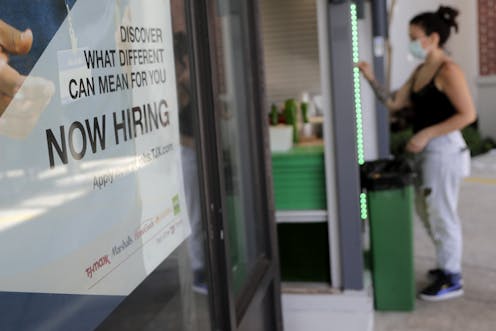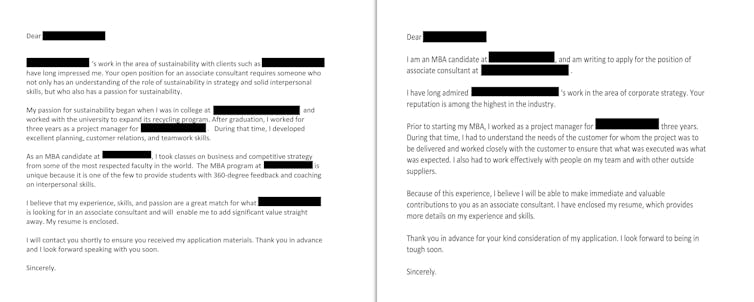Lost your job due to coronavirus? Artificial intelligence could be your best friend in finding a new one
- Written by Stewart Black, Professor of Management Practice in Global Leadership and Strategy, INSEAD
 Some places are still hiring.AP Photo/Lynne Sladky
Some places are still hiring.AP Photo/Lynne SladkyMillions of Americans are unemployed and looking for work. Hiring continues, but there’s far more demand for jobs than supply.
As scholars of human resources and management, we believe artificial intelligence could be a boon for job seekers who need an edge in a tight labor market like today’s.
What’s more, our research suggests it can make the whole process of finding and changing jobs much less painful, more effective and potentially more lucrative.
Make me a match
Over the last three years, we’ve intensely studied the role of AI in recruiting. This research shows that job candidates are positively inclined to use AI in the recruiting process and find it more convenient than traditional analog approaches.
Although companies have been usingAI in hiring for a few years, job applicants have only recently begun to discover the power of artificial intelligence to help them in their search.
In the old days, if you wanted to see what jobs were out there, you had to go on a job board like Monster.com, type in some keywords, and then get back hundreds or even thousands of open positions, depending on the keywords you used. Sorting through them all was a pain.
Today, with AI and companies like Eightfold, Skillroads and Fortay, it is less about job search and more about matchmaking. You answer a few questions about your capabilities and preferences and provide a link to your LinkedIn or other profiles. AI systems that have already logged not just open jobs but also analyzed the companies behind the openings – based on things like reputation, culture and performance – then produce match reports showing the best fits for you in terms of job and company.
Typically, there is an overall match score expressed as a percentage from 0% to 100% for each job. In many cases the report will even tell you which skills or capabilities you lack – or have not included – and how much their inclusion would increase your match score. The intent is to help you spend your time on opportunities that are more likely to result in your getting hired and being happy with the job and company after the hire.
Crafting a winning CV
Usually, when you look for a job, you apply to lots of openings and companies at the same time. That means two choices: save time by sending each one a mostly generic resume, with minor tweaks for each, or take the time and effort to adjust and tailor your resume to better fit specific jobs.
Today, AI tools can help customize your resume and cover letter for you. They can tell you what capabilities you might want to add to your resume, show how such additions would influence your chances of being hired and even rewrite your resume to better fit a specific job or company. They can also analyze you, the job and the company and craft a customized cover letter.
While researchers have not yet systemically examined the quality of human- versus AI-crafted cover letters, the AI-generated samples we’ve reviewed are difficult to distinguish from the ones we’ve seen MBA graduates write for themselves over the last 30 years as professors. Try it for yourself.
Granted, for lots of lower-level jobs, cover letters are relics of the past. But for higher-level jobs, they are still used as an important screening mechanism.
 One of these cover letters was written by an MBA student. The other was generated by artificial intelligence. Can you tell which one is which?Author provided, Author provided
One of these cover letters was written by an MBA student. The other was generated by artificial intelligence. Can you tell which one is which?Author provided, Author providedShow me the money
Negotiations over compensation are another thorny issue in the job search.
Traditionally, applicants have been at a distinct informational disadvantage, making it harder to negotiate for the salary they may deserve based on what others earn for similar work. Now AI-enabled reports from PayScale.com, Salary.com, LinkedIn Salary and others provide salary and total compensation reports tailored to job title, education, experience, location and other factors. The data comes from company reported numbers, government statistics and self-reported compensation.
For self-reported data, the best sites conduct statistical tests to ensure the validity and accuracy of the data. This is only possible with large databases and serious number crunching abilities. PayScale.com, for example, has over 54 million respondents in its database and surveys more than 150,000 people per month to keep its reports up-to-date and its database growing.
Although no academics have yet tested if these reports result in better compensation packages than in the old days, research has long established that negotiating in general gets candidates better compensation offers, and that more information in that process is better than less.
[Deep knowledge, daily.Sign up for The Conversation’s newsletter.]
Growing use of AI in hiring
Use of these tools is growing, especially among young people.
A survey we conducted in 2018 found that half of employed workers aged 18 to 36 said that they were likely or highly likely to use AI tools in the job search and application process. And 64% of these respondents felt that AI-enabled tools were more convenient.
Most of the research on the use of AI in the hiring process – including our own – has focused on recruitment, however, and the use of the technology is expected to double over the next two years. We’ve found it to be effective for companies, so it seems logical that it can be very useful for job candidates as well. In fact, at least US$2 billion in investments are fueling human resources startups aimed at using AI to help job candidates, according to our analysis of Crunchbase business data.
While more research is needed to determine exactly how effective these AI-enabled tools actually are, Americans who lost their jobs due to the coronavirus could use all the help they can get.
The authors do not work for, consult, own shares in or receive funding from any company or organization that would benefit from this article, and have disclosed no relevant affiliations beyond their academic appointment.
Authors: Stewart Black, Professor of Management Practice in Global Leadership and Strategy, INSEAD

